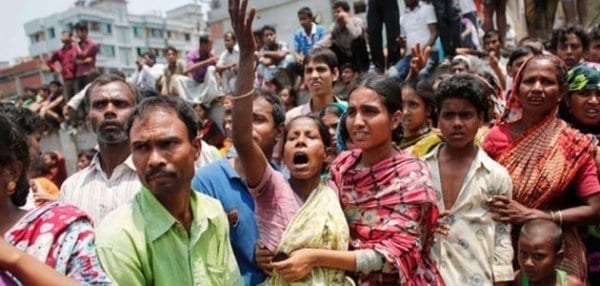
Apr 6, 2015
Three years after the torture and murder of garment worker union leader Aminul Islam, his killers have not been brought to justice.
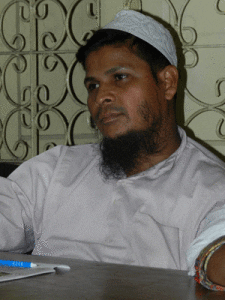
No one has been prosecuted for the torture and murder of garment worker union leader Aminul Islam.
The AFL-CIO and eight other global global labor rights organizations have written to Bangladesh Prime Minister Sheikh Hasina on the anniversary of his murder to demand his killers be located and prosecuted.
Aminul, 39, disappeared on April 4, 2012, and his body was found a few days later with signs of torture. He was a plant-level union leader at an export processing zone in Bangladesh, an organizer for the Bangladesh Center for Workers’ Solidarity (BCWS), and president of the Bangladesh Garment and Industrial Workers Federation’s (BGIWF) local committee in the Savar and Ashulia areas of Dhaka.
Despite international outcry, including a U.S. congressional hearing and then U.S. Secretary of State Hillary Clinton’s call for justice in the case, Aminul’s murder has gone unsolved. He had sought to improve the working conditions of some 8,000 garment workers employed by Shanta Group, a garment manufacturer based in Dhaka.
After the United States revoked preferential trade benefits for Bangladesh in 2013, citing human and labor rights abuses, the Bangladesh government dropped criminal charges against two garment worker leaders who worked with him, and announced it would step up the search for the people responsible for his torture and murder. Instead, the government dropped an investigation against a suspect and has taken no further steps to resolve the case.
“A sewing machine and a dozen colorful threads still give hope and strength to labor leader Aminul Islam’s family” but his widowed wife, Husne Ara, works around the clock to pay for food and school tuition for her children, writes the Bangladesh Daily Star.
Husne Ara said that Aminul could not speak over the phone because “he feared it was tapped.
“Even in the middle of the night, he received arbitrary phone calls from the intelligence,” she says.
Since Aminul’s murder, more than 1,200 garment workers were killed in the 2012 Tazreen factory fire and the 2013 collapse of Rana Plaza. After Rana Plaza, at least 44 workers have died in garment factory fire incidents in Bangladesh, and more than 900 people have been injured.
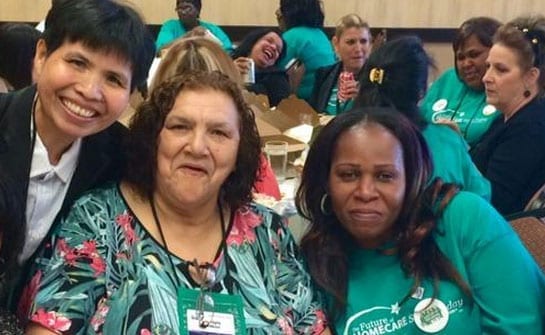
Apr 3, 2015
Myrtle Witbooi spent decades toiling as a domestic worker in South Africa and later built on her experience to become a national and global leader for domestic worker rights.
Now general secretary of the South African Domestic Service and Allied Workers Union (SADSAWU) and the first president of the International Domestic Workers Federation (IDWF), Witbooi says IDWF’s goals involve outreach to countries that do not have laws covering domestic workers and determining “how can we empower domestic workers to speak up for themselves, how can we empower domestic workers to form their own organizations and defy those who stand in their way.”
Witbooi made her comments in an interview on the Africa Today radio program in Sacramento, California, where she was participating in the United Domestic Workers of America/AFSCME convention. She and other domestic workers and advocates from around the world met with U.S. homecare workers last month as part of the Solidarity Center’s Multi-Regional Exchange for Domestic Worker and Migrant Worker Rights Activists and Leaders.
In connecting with U.S. homecare workers, Witbooi sought to put in play a fundamental union principle: strength through solidarity. “United, we can speak in one voice and in one language and that’s why we can win many more things for domestic workers,” she says.
In the interview, Witbooi offers an overview of the struggle by South Africa’s domestic workers to gain the same rights and protections as other workers. At one point, domestic workers chained themselves to the Parliament gates, one of a series of ongoing actions that resulted in the nation’s 2002 labor law covering domestic workers. Domestic workers went on to win unemployment compensation and a minimum wage.
Witbooi proudly says the global federation, formed in 2012, is “run by and controlled by women,” and notes its goals involve “forming organizations to empower women to be able to speak out for themselves.”
“To be able to say, ‘This is my right and I demand that you respect me as a woman and also my work is decent work and I want decent pay.’ ”
Listen to the full interview here (beginning at 19:54).
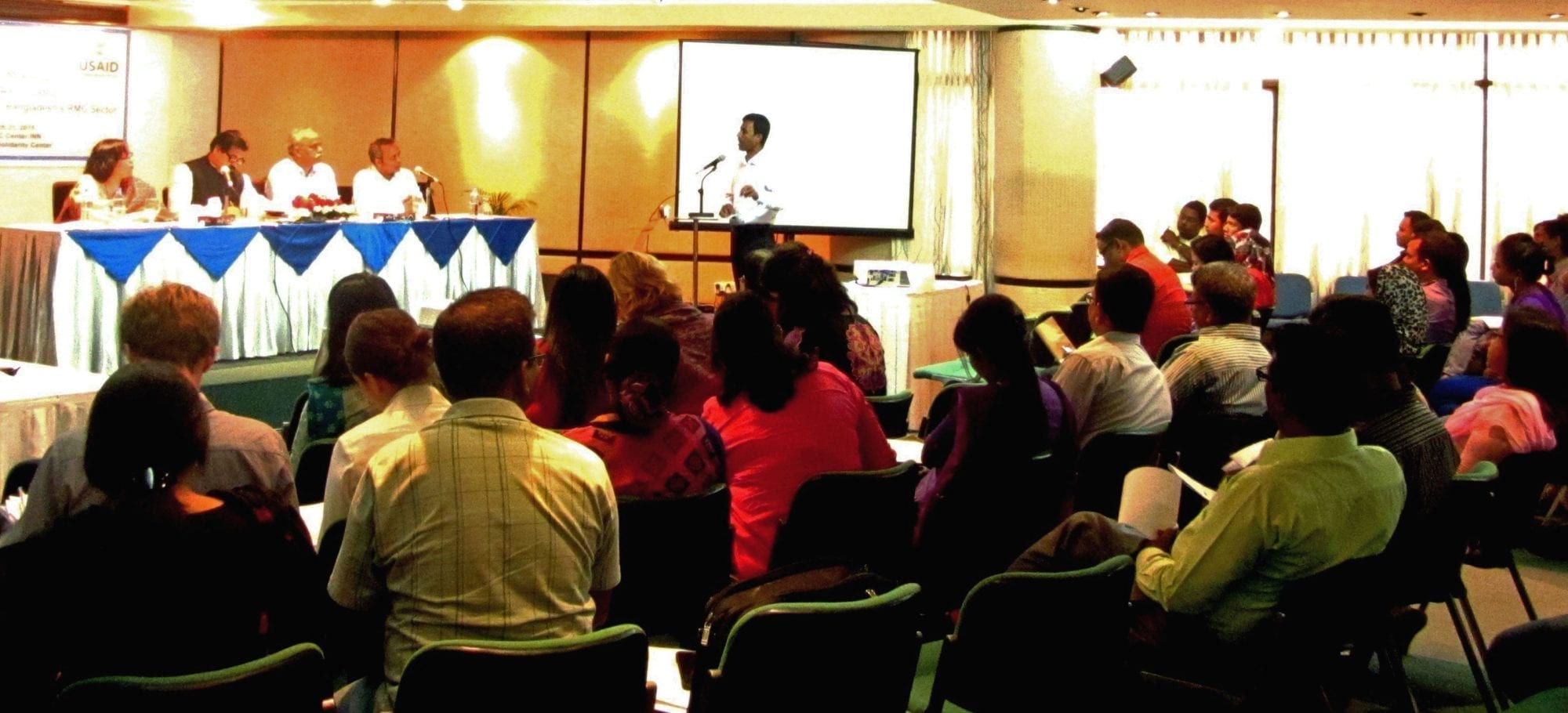
Apr 3, 2015
After workers form a union in Bangladesh’s garment sector, the government often refuses to register the new union for arbitrary or unfair reasons, said trade union leaders and workers Tuesday at a high-level forum organized by the Solidarity Center in Dhaka, the capital.
“If workers fulfill all the requirements of union registration, they should not have their unions rejected,” said Chandon Kumar De, acting general secretary of Bangladesh Independent Garment Workers Union Federation (BIGUF).
Chandon was among six workers and union leaders testifying at the forum, which drew 60 participants, including representatives from non-governmental and intergovernmental organizations, trade unions, and representatives of foreign governments.
Despite garment workers’ success in establishing unions in the past year, workers and union organizers have been harassed, threatened and some physically attacked when trying to exercise their rights to be paid what they are owed and to work in a safer workplace. More than 80 factories have been closed or the unions dismantled in the past two years, and more than 100 unions that filed for registration have been rejected by the government. Government rejections of unions that applied for registration increased from 19 percent in 2013 to 56 percent so far this year, according to data the Solidarity Center compiled.
Several workers who spoke described how, after filing to register their new unions, government officials visit the workplace and ask workers in the presence of their employer whether they joined a union. Fearful of losing their jobs, the workers deny participation in union activities, and the government declares the union cannot be registered for lack of awareness. Others described how their unions were rejected by the government because management refused to allow officials into a factory to investigate, regardless of whether the union fulfilled all legal registration requirements or not.
Workers also described freedom of association violations such as mass terminations, violence and threats to discourage union activity.
“Workers risk a lot when they organize,” Chandon said. “They are threatened and sometimes beat up by management and local goons. When we file unfair labor practices with the government, there is rarely action taken.”
A member of Parliament and leading labor academics presented recommendations to improve freedom of association and the union registration process. The recommendations in part urge government officials to cease interviewing workers about union activity in the presence of management and also to provide unions the opportunity to address any potential issues with the registration application early in the process.
“There needs to be a clear, consistent and transparent union registration process,” said Bangladesh Institute for Labor Studies Executive Director Syed Sultan Uddin Ahmed. “We need mechanisms where workers can swiftly get the justice they deserve when their rights are violated. These need to investigate, address and penalize employers for unfair labor practices to end the culture of impunity that surrounds employer resistance to legally protected union activity.”
Following the Rana Plaza collapse in April 2013 and other high-profile catastrophes at Bangladesh garment factories, the government showed signs of recognizing worker rights and its own labor laws, allowing workers to form unions. But last year, garment workers increasingly faced barriers to joining a union, including physical violence and employer intimidation at the workplace in addition to issues in the government’s union registration process.
Apr 1, 2015
This report on global migration argues that the recognition and protection of the rights of migrant workers, their families and their communities must be the focal point of any application of the capabilities approach now accepted within the international development community.
This paper investigates the intersection of labor migration and the inclusive growth agenda, and seeks to recommend policy interventions so governments of origin countries can limit the threats labor migration poses to sustainable and rights-based development, and expand labor migration’s positive impacts by making migrant workers agents in promoting and realizing an inclusive growth agenda in their origin communities.
In this review of initiatives to regulate labor brokers, the authors find that state and civil society efforts to address migrant worker exploitation point to potential new policies, most effectively led by state-backed regulatory frameworks.
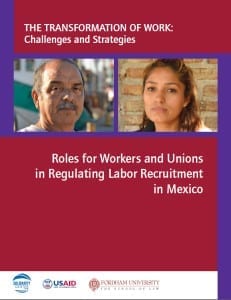
Fordham University law professor Jennifer Gordon examines the roles of guest workers as organizers, monitors and policy-setters in supply chain initiatives and other efforts to address labor recruitment violations.
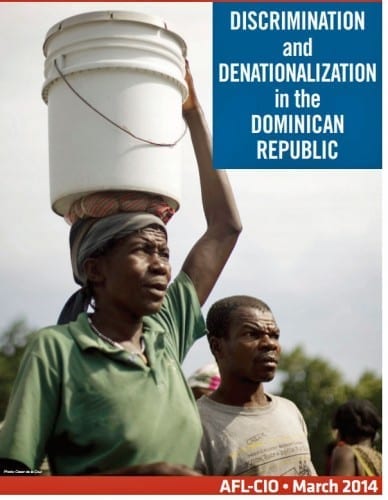
A September 2013 Dominican court ruling taking away citizenship from many migrants means they will be excluded from any activity that requires official identification, including working in the formal sector, attending school, opening a bank account, accessing health services, getting married, traveling or voting.
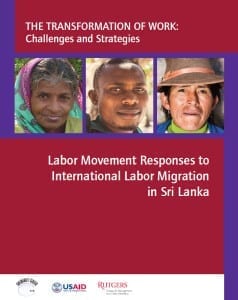
This report looks at the political and economic context within which Sri Lankan unions have attempted to respond to migrant workers, unions’ role in the key governance and policy mechanisms that pertain to labor migration, and the way the Sri Lankan labor movement responded to international migrant workers.
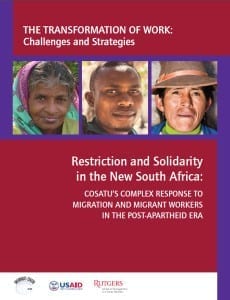
This report look at South African labor’s complicated engagement with migrant workers by examining the migration policy debate, labor’s response to the xenophobic attacks of 2008 and two organizing campaign in the agricultural sector. It sheds light on how labor migration and hostility toward immigrants are intertwined with the state’s embrace of neo-liberal economic policy and with growing labor precariousness.
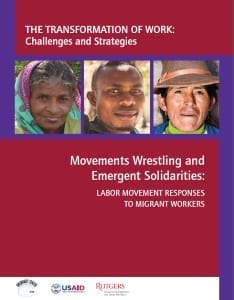
This report synthesizes a two-year project. Part one consisted of desk and case study research conducted by telephone in Jordan and the Dominican Republic looking into cases where unions had made significant changes in their approach to migrant worker organizing. Part two involved field studies in South Africa and Sri Lanka and provides analysis of strategies and results.
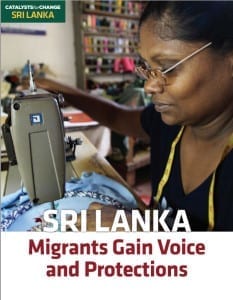 Sri Lanka: Migrants Gain Voice and Protections
Sri Lanka: Migrants Gain Voice and Protections
The Migrant Services Center, a Solidarity Center partner, is assisting migrant workers and their families in Sri Lanka while championing structural change through legislative and governmental processes, and offers a model for other labor and worker rights organizations.
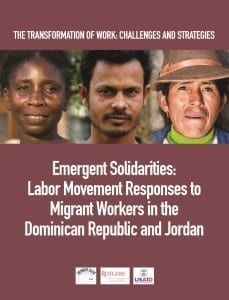
This report explores examples of unions making significant change in their approaches to migrant worker organizing and how the Solidarity Center has played a role in shifting union thinking about migrant workers and supporting union engagement and activities.
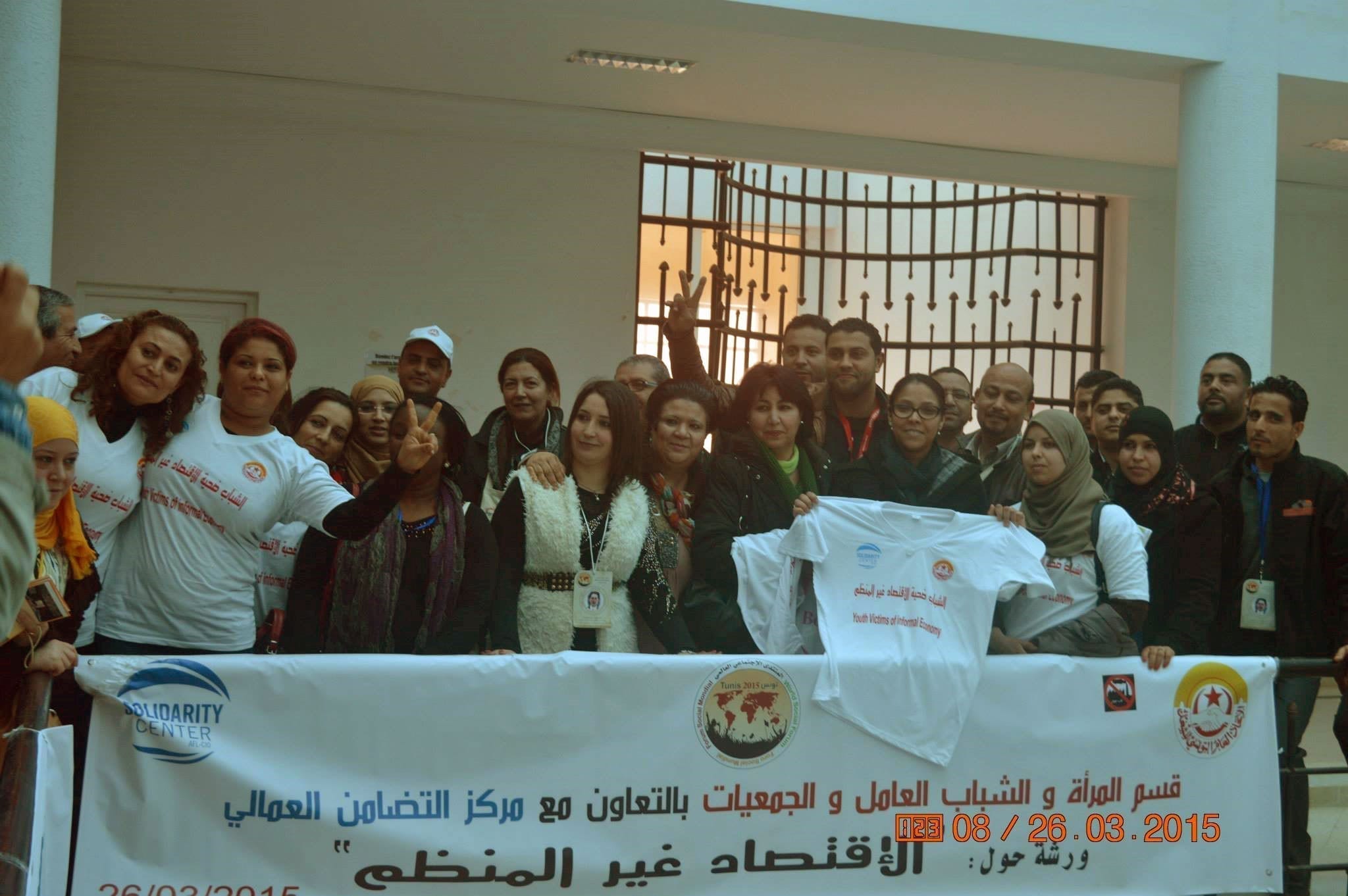
Mar 30, 2015
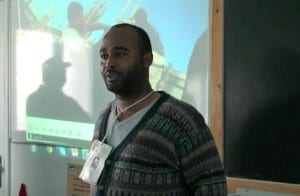
Maher Dribik was among presenters at the UGTT National Youth Workers Commission workshop on informal economy workers. Credit: Lassaad Mahmoudi
More than 60 worker advocates shared strategies for empowering workers, especially women and young workers, trapped in informal economy jobs during last week’s World Social Forum in Tunis, Tunisia. Sponsored by the National Youth Workers Commission of the General Union of Tunisian Workers, (Union Générale Tunisienne du Travail, UGTT), together with the Solidarity Center, the workshop brought together representatives of European, Asian and Arab civil society organizations.
During the half-day workshop, the Youth Workers Commission shared a report on informal economy workers in Tunisia the UGTT released last year. The report found that 67 percent of Tunisian workers in the informal economy do not benefit from social protections such as paid sick leave, and pointed out that the informal economy is growing, accounting for 38 percent of Tunisia’s gross domestic product (GDP) in 2013, compared with 30 percent in 2010.
Workshop participants suggested the need for employers, workers and the government to work together to define a new development model; reform programs covering social protections; and encourage a sense of citizenship among workers and employers in the informal economy. The workshop also served to build and strengthen alliances between civil society organizations and trade unions.
Some 70,000 participants, representing more than 4,000 organizations took part in the World Social Forum. The five-day event serves as an annual counterweight to the Davos World Economic Forum, where top political leaders and business elites meet to discuss economic issues.





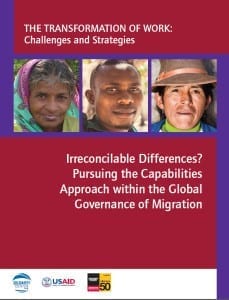
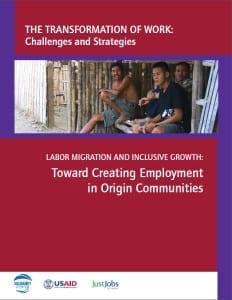
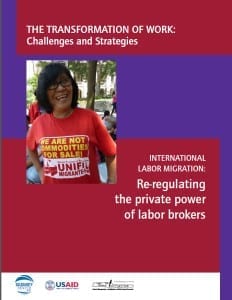 International Labor Migration: Re-regulating the Private Power of Labor Brokers
International Labor Migration: Re-regulating the Private Power of Labor Brokers







